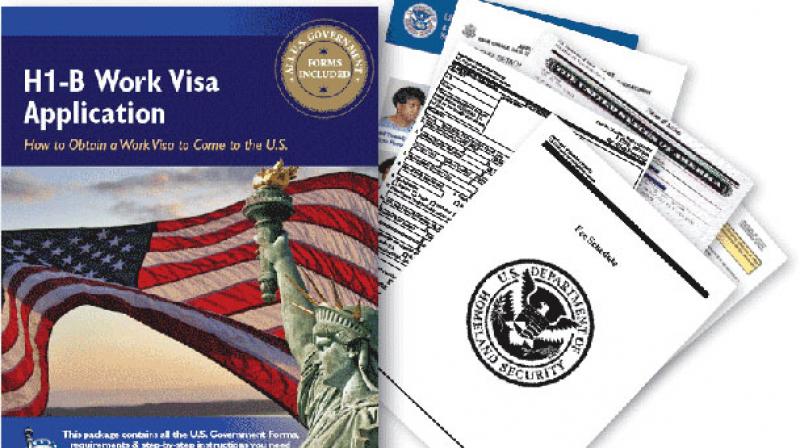H1B visa row in WTO may lead to trade retaliation against US: report

Washington: Months after India dragged the US to WTO over imposing increased fees on H-1B and L-1 visas, a Congressional report has warned American lawmakers that if the dispute moves to formal settlement phase it could possibly result in a WTO-authorised trade retaliation against the US.
"If the dispute moves to the formal dispute settlement panel phase, one potential outcome could be a WTO determination that the disputed statutes are inconsistent with GATS obligations and a recommendation that the US should modify its laws to comply with the GATS," said the Congressional Research Service (CRS) report.
CRS, an independent research wing of the US Congress, warned lawmakers that in such a scenario compliance procedures could subject the US to WTO-authorised trade retaliation if Congress does not amend the pertinent laws.
The brief two-page report and analysis on India challenging H-1B and L1 visa fee increase before the WTP was provided to American lawmakers on November 16.
In March this year, India dragged the US to WTO's dispute settlement body against the latter's measures imposing increased fees on certain applicants for L-1 and H-1B visa categories. India has stated that the move would impact Indian IT professionals.
The CRS said the dispute concerns US immigration laws which increased fees for certain temporary foreign workers and allotted a specific number of temporary worker visas to Chilean and Singaporean nationals.
India has alleged that the US is violating its obligations under General Agreement on Trade in Services (GATS), a binding agreement for all WTO member countries, as well as the GATS Annex on Movement of Natural Persons Supplying Services, to not discriminate against or between non-US service providers.
"Based on CRS records, this appears to be the first time a WTO member has formally filed a dispute challenging the immigration laws of another member as a violation of the GATS," the CRS said.
With the help of eminent subject experts, CRS periodically prepares reports and analyzes on issues of interest to the lawmakers so that they can take informed decisions. CRS reports are not the official view or report of the US Congress.
In its analysis, CRS said, for several years certain US observers cautioned that fee increases for temporary foreign worker petitions and other immigration changes might be disputed as GATS violations.
Others suggested that this challenge is an attempt to offset India's loss to the US in another recent WTO dispute over India's laws regulating solar energy, it said.
CRS said India contends, among other things, that the 2010 and 2015 fee increases do not comply with "most-favoured-nation (MFN) treatment" under the GATS, which generally prohibits a WTO member from treating the services and service suppliers of one WTO member less favourably than it treats comparable services and suppliers of another.
While the fee hike does not specifically mention Indian companies, such a provision has been tailored in such a manner that it impacts only Indian IT companies, many experts alleged, the report said.
"This alleged effect might be relevant to India's claim because the WTO has recognised that a GATS MFN violation may result when a facially neutral measure has a comparatively disproportionate negative impact on service suppliers of one WTO Member," the CRS said.
In its analysis, CRS noted that the petition fees increases mandated by the 2010 and 2015 acts are "arguably protectionist" because they "may exceed" the government's cost in processing a visa applicant and also could be punitive measures targeting employers perceived by some Members of Congress as abusers of the foreign worker visas.
The report, however, says that the Indian charge on the allotments to Chilean and Singaporean nationals, may not violate GATS obligations because the total number of H-1B visas issues annually exceed the cap listed in the US Schedule due to various cap exceptions, meaning that countries like India would not be harmed by the allotments.
The CRS noted that the dispute remains in consultations, the first phase in WTO disputes, and neither party has submitted any detailed legal arguments to the WTO.
"Although US officials reportedly have asserted confidence that the disputed laws are fully consistent with WTO obligations, US officials have informed Indian officials they would review the fee increases," the report said, adding that no further public pledge has been made, however, to modify current US immigration policies.
Warning the lawmakers that the US is on a weak wicket on this issue, the report warned that if the dispute moves to the formal dispute settlement panel phase, WTO could rule that this policy is inconsistent with its GATS obligations. And as such WTO may ask US to comply with the GATS.
"Compliance procedures could subject the US to WTO-authorised trade retaliation if the Congress does not amend the pertinent law," the CRS report warned.
It quickly noted that a WTO panel report does not have direct legal effects on US laws and policies; Congress would have to legislate any conforming statutory amendment.
"Even if India were to prevail in an adopted report, India could choose to agree to disagree with the United States without seeking compliance," the CRS said.
"As a potentially far-reaching effect, a successful challenge to a member’s immigration laws could signal that other immigration measures of WTO members may be subject to greater scrutiny, rather than generally being accepted as border control measures consistent with WTO exceptions, US commitments and long-standing recognition of sovereign prerogatives," CRS said.

